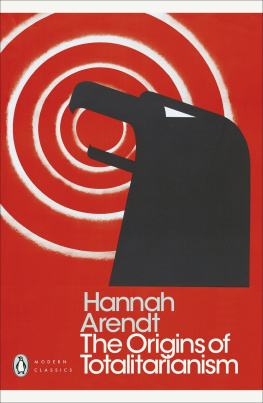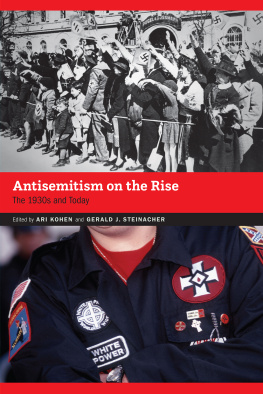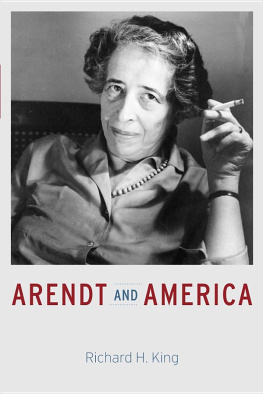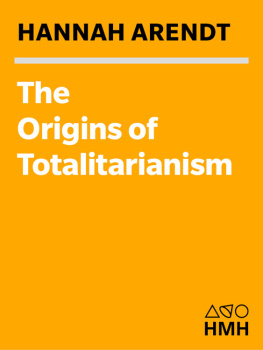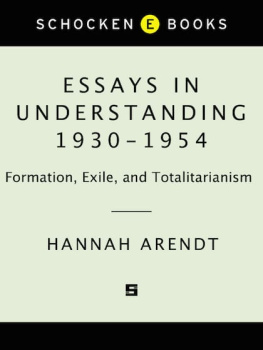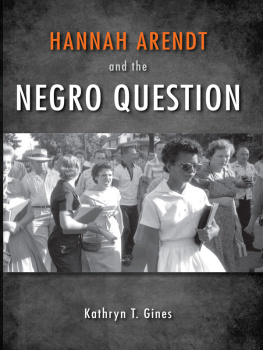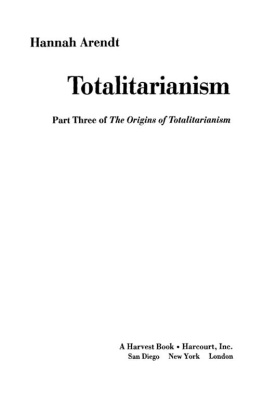Arendt - Antisemitism: Part One of the Origins of Totalitarianism
Here you can read online Arendt - Antisemitism: Part One of the Origins of Totalitarianism full text of the book (entire story) in english for free. Download pdf and epub, get meaning, cover and reviews about this ebook. City: San Diego, New York, London, year: 1985, publisher: Houghton Mifflin Harcourt;Harvest Books;Harcourt Brace, genre: Politics. Description of the work, (preface) as well as reviews are available. Best literature library LitArk.com created for fans of good reading and offers a wide selection of genres:
Romance novel
Science fiction
Adventure
Detective
Science
History
Home and family
Prose
Art
Politics
Computer
Non-fiction
Religion
Business
Children
Humor
Choose a favorite category and find really read worthwhile books. Enjoy immersion in the world of imagination, feel the emotions of the characters or learn something new for yourself, make an fascinating discovery.
Antisemitism: Part One of the Origins of Totalitarianism: summary, description and annotation
We offer to read an annotation, description, summary or preface (depends on what the author of the book "Antisemitism: Part One of the Origins of Totalitarianism" wrote himself). If you haven't found the necessary information about the book — write in the comments, we will try to find it.
Arendt: author's other books
Who wrote Antisemitism: Part One of the Origins of Totalitarianism? Find out the surname, the name of the author of the book and a list of all author's works by series.
Antisemitism: Part One of the Origins of Totalitarianism — read online for free the complete book (whole text) full work
Below is the text of the book, divided by pages. System saving the place of the last page read, allows you to conveniently read the book "Antisemitism: Part One of the Origins of Totalitarianism" online for free, without having to search again every time where you left off. Put a bookmark, and you can go to the page where you finished reading at any time.
Font size:
Interval:
Bookmark:
Copyright 1968, 1958 by Hannah Arendt
Copyright 1951 by Hannah Arendt
Copyright renewed 1979 by Mary McCarthy West
All rights reserved. No part of this publication may be reproduced or transmitted in any form or by any means, electronic or mechanical, including photocopy, recording, or any information storage and retrieval system, without permission in writing from the publisher.
For information about permission to reproduce selections from this book, write to Permissions, Houghton Mifflin Harcourt Publishing Company, 215 Park Avenue South, New York, New York 10003.
www.hmhbooks.com
The Library of Congress has cataloged the print edition as follows:
Arendt, Hannah.
The origins of totalitarianism
"A Harvest book."
Includes bibliographies and indexes.
Contents: pt. 1. Antisemitismpt. 2. Imperialismpt. 3. Totalitarianism.
1. Totalitarianism. 2. Imperialism. 3. Antisemitism. I. Title.
JC481.A62 1985 321.9 84-22579
ISBN 0-15-607810-4 (pbk.:v. 1)
eISBN 978-0-544-10797-7
v1.1112
TO HEINRICH BLCHER
A NTISEMITISM, a secular nineteenth-century ideologywhich in name, though not in argument, was unknown before the 1870's-and religious Jew-hatred, inspired by the mutually hostile antagonism of two conflicting creeds, are obviously not the same; and even the extent to which the former derives its arguments and emotional appeal from the latter is open to question. The notion of an unbroken continuity of persecutions, expulsions, and massacres from the end of the Roman Empire to the Middle Ages, the modem era, and down to our own time, frequently embellished by the idea that modem antisemitism is no more than a secularized version of popular medieval superstitions, This shift in evaluating the alien character of the Jewish people, which became common among non-Jews only much later in the Age of Enlightenment, is clearly the condition sine qua non for the birth of antisemitism, and it is of some importance to note that it occurred in Jewish self-interpretation first and at about the time when European Christendom split up into those ethnic groups which then came politically into their own in the system of modem nation-states.
so well had its spokesmen succeeded in convincing themselves and everybody else of the non-fact that Jewish separateness was due exclusively to Gentile hostility and lack of enlightenment. Judaism, it was now maintained chiefly by Jewish historians, had always been superior to other religions in that it believed in human equality and tolerance. That this self-deceiving theory, accompanied by the belief that the Jewish people had always been the passive, suffering object of Christian persecutions, actually amounted to a prolongation and modernization of the old myth of chosenness and was bound to end in new and often very complicated practices of separation, destined to uphold the ancient dichotomy, is perhaps one of those ironies which seem to be in store for those who, for whatever reasons, try to embellish and manipulate political facts and historical records. For if Jews had anything in common with their non-Jewish neighbors to support their newly proclaimed equality, it was precisely a religiously predetermined, mutually hostile past that was as rich in cultural achievement on the highest level as it was abundant in fanaticism and crude superstitions on the level of the uneducated masses.
thus obliterating the otherwise more important fact that Jewish dissociation from the Gentile world, and more specifically from the Christian environment, has been of greater relevance for Jewish history than the reverse, for the obvious reason that the very survival of the people as an identifiable entity depended upon such voluntary separation and not, as was currently assumed, upon the hostility of Christians and non-Jews. Only in the nineteenth and twentieth centuries, after emancipation and with the spread of assimilation, has antisemitism played any role in the conservation of the people, since only then did Jews aspire to being admitted to non-Jewish society.
When, after the close of the war, I began to organize the material for this book, which had been collected from documentary sources and sometimes excellent monographs over a period of more than ten years, there did not exist a single over-all presentation of its subject matter that could be said to conform to the most elementary standards of historical scholarship. And the situation has hardly changed since. This is all the more deplorable as the need for an impartial, truthful treatment of Jewish history has recently become greater than it has ever been before. Twentieth-century political developments have driven the Jewish people into the storm center of events; the Jewish question and antisemitism, relatively unimportant phenomena in terms of world politics, became the catalytic agent first for the rise of the Nazi movement and the establishment of the organizational structure of the Third Reich, in which every citizen had to prove that he was not a Jew, then for a world war of unparalleled ferocity, and finally for the emergence of the unprecedented crime of genocide in the midst of Occidental civilization. That this called not only for lamentation and denunciation but for comprehension seemed to me obvious. This book is an attempt at understanding what at first and even second glance appeared simply outrageous.
Comprehension, however, does not mean denying the outrageous, deducing the unprecedented from precedents, or explaining phenomena by such analogies and generalities that the impact of reality and the shock of experience are no longer felt It means, rather, examining and bearing consciously the burden that events have placed upon usneither denying their existence nor submitting meekly to their weight as though everything that in fact happened could not have happened otherwise. Comprehension, in short, means the unpremeditated, attentive facing up to, and resisting of, reality-whatever it may be or might have been.
For this comprehension a certain familiarity with Jewish history in nineteenth-century Europe and the attendant development of antisemitism is indispensable though, of course, not sufficient. The following chapters deal with only those elements in nineteenth-century history which indeed belong among the "origins of totalitarianism." A comprehensive history of antisemitism remains still to be written and is beyond the scope of this book. So long as this lacuna exists, there is enough justification even in terms of mere scholarship to publish the following chapters as an independent contribution toward a more comprehensive history, although it was originally conceived as a constituent part of the prehistory, as it were, of totalitarianism. Moreover, what is true for the history of antisemitism, that it fell into the hands of non-Jewish crackpots and Jewish apologetics, and was carefully avoided by reputable historians, is true, mutatis mutandis, for nearly all elements that later crystallized in the novel totalitarian phenomenon; they had hardly been noticed by either learned or public opinion because they belonged to a subterranean stream of European history where, hidden from the light of the public and the attention of enlightened men, they had been able to gather an entirely unexpected virulence.
Since only the final crystallizing catastrophe brought these subterranean trends into the open and to public notice, there has been a tendency to simply equate totalitarianism with its elements and originsas though every outburst of antisemitism or racism or imperialism could be identified as "totalitarianism." This fallacy is as misleading in the search for historical truth as it is pernicious for political judgment. Totalitarian politicsfar from being simply antisemitic or racist or imperialist or communistuse and abuse their own ideological and political elements until the basis of factual reality, from which the ideologies originally derived their strength and their propaganda valuethe reality of class struggle, for instance, or the interest conflicts between Jews and their neighborshave all but disappeared. It certainly would be a serious error to underestimate the role sheer racism has played and is still playing in the government of the Southern states, but it would be an even more serious fallacy to arrive at the retrospective conclusion that large areas of the United States have been under totalitarian rule for more than a century. The only direct, unadulterated consequence of nineteenth-century antisemitic movements was not Nazism but, on the contrary, Zionism, which, at least in its Western ideological form, was a kind of counterideology, the "answer" to antisemitism. This, incidentally, is not to say that Jewish self-consciousness was ever a mere creation of antisemitism; even a cursory knowledge of Jewish history, whose central concern since the Babylonian exile has always been the survival of the people against the overwhelming odds of dispersion, should be enough to dispel this latest myth in these matters, a myth that has become somewhat fashionable in intellectual circles after Sartre's "existentialist" interpretation of
Next pageFont size:
Interval:
Bookmark:
Similar books «Antisemitism: Part One of the Origins of Totalitarianism»
Look at similar books to Antisemitism: Part One of the Origins of Totalitarianism. We have selected literature similar in name and meaning in the hope of providing readers with more options to find new, interesting, not yet read works.
Discussion, reviews of the book Antisemitism: Part One of the Origins of Totalitarianism and just readers' own opinions. Leave your comments, write what you think about the work, its meaning or the main characters. Specify what exactly you liked and what you didn't like, and why you think so.


